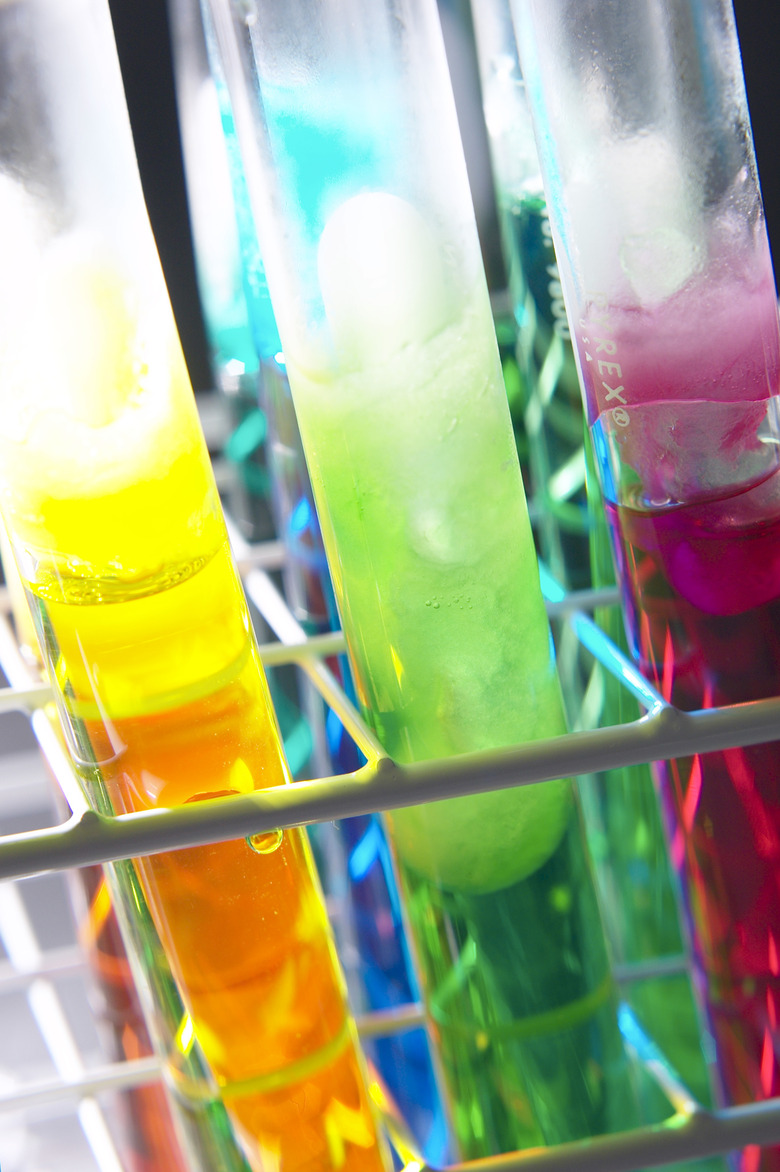What Kinds Of Chemicals Will Speed Up The Action Of An Enzyme?
Each of your body's trillions of cells depends upon thousands of chemical reactions. The chemical reactions that take place inside your body could take place in a test tube, but they'd happen much more slowly – too slowly to support the activities of a living organism.
Enzymes are proteins within living organisms that help chemical reactions along. Their ability to function and the speed with which they work is influenced by several factors. Some of those factors are other chemicals.
How Enzymes Work
How Enzymes Work
Chemical reactions involve the breaking and formation of bonds between atoms. Breaking the bonds of the initial chemicals – the reactants – takes energy. That's called the activation energy. Enzymes are proteins that grab on to the reactants and orient them in such a way that the activation energy is lower. The reactants are also called substrates.
An enzyme acts to bind substrates in specific locations called active sites. Active sites are shaped in a way that allows them to latch on to specific substrates. The bound enzyme-substrate complex makes it easier for reactants to break their bonds and form new ones in the product.
Then the product is released from the enzyme.
Chemicals That Help Chemical Reactions: Cofactors
Chemicals That Help Chemical Reactions: Cofactors
The shape of the active site is what allows enzymes to work. If the active site is distorted, the substrate will not bind and the reaction will not be helped along. Some enzymes require kinds of chemicals called cofactors to assume the proper shape.
Cofactors can be in the form of inorganic atoms or organic molecules. Examples of cofactors include an ionized zinc atom – one that has lost a couple of electrons – which is necessary in the enzyme alcohol dehydrogenase, used to metabolize alcohol.
The molecule nicotinamide adenine dinucleotide is a common organic molecular cofactor, and is also called a coenzyme. It often participates in reactions that require the transfer of hydrogen atoms or ions. Coenzymes and inorganic cofactors may be necessary for an enzyme to work, and if there aren't enough of them, then the overall reaction rate will be slow.
Chemicals That Help Chemical Reactions: Substrates
Chemicals That Help Chemical Reactions: Substrates
Each enzyme has one specific function. An enzyme that splits a fructose molecule into two parts cannot be used to release oxygen from red blood cells. For a reaction to happen, both the enzyme and the substrate need to be present. The reaction rate can be limited by a shortage of either enzyme or substrate.
Put another way, if there is a lot of substrate in a cell and not much enzyme, adding more enzyme will increase the reaction rate. Conversely, if there's a lot of enzyme and not much substrate, adding substrate will increase the reaction rate. However, adding more substrate when there is a lot of substrate and not much enzyme (or adding more enzyme in the opposite situation) will not increase the reaction rate.
Faster Reaction Rates
Faster Reaction Rates
The actual speed of an enzyme-catalyzed reaction doesn't change. That is, the time from binding of the substrate to release of the product is the same for each particular type of enzyme. When one talks about speeding up the action of an enzyme, one means increasing the number of enzymes actively participating in chemical reactions so that the total number of reactions goes up.
For example, if there's not enough zinc to match with all of a specific type of DNA-processing enzyme in a cell, then adding more zinc will increase the reaction rate by making it possible for more enzymes to be active.
The same with adding more substrate or more enzyme: The action gets sped up by allowing more enzymes to catalyze chemical reactions, not by speeding up any one particular enzyme.
Cite This Article
MLA
Gaughan, Richard. "What Kinds Of Chemicals Will Speed Up The Action Of An Enzyme?" sciencing.com, https://www.sciencing.com/kinds-chemicals-speed-up-action-enzyme-21585/. 8 March 2019.
APA
Gaughan, Richard. (2019, March 8). What Kinds Of Chemicals Will Speed Up The Action Of An Enzyme?. sciencing.com. Retrieved from https://www.sciencing.com/kinds-chemicals-speed-up-action-enzyme-21585/
Chicago
Gaughan, Richard. What Kinds Of Chemicals Will Speed Up The Action Of An Enzyme? last modified August 30, 2022. https://www.sciencing.com/kinds-chemicals-speed-up-action-enzyme-21585/
